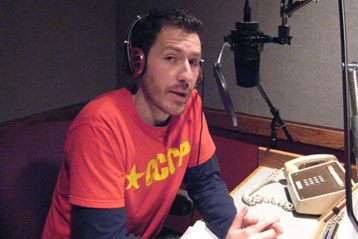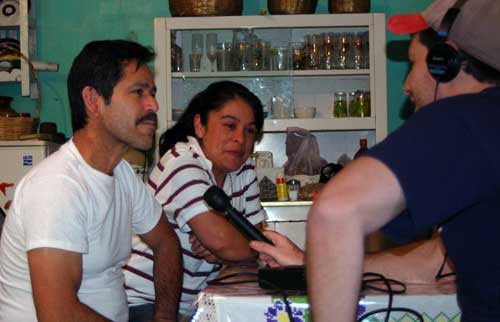Este artículo también está disponible en: Español
 Radio is a medium with which the audience can develop a deep relationship. That’s what I love about it. I’m a devoted radio listener, especially of U.S. public radio shows that I follow live or through podcasts, like On The Media, Wait Wait Don’t Tell Me or Studio 360.
Radio is a medium with which the audience can develop a deep relationship. That’s what I love about it. I’m a devoted radio listener, especially of U.S. public radio shows that I follow live or through podcasts, like On The Media, Wait Wait Don’t Tell Me or Studio 360.
So you can imagine the thrill I experienced when I became a public radio producer myself, with the chance to air my stories on New York’s WNYC, the biggest public radio station in the country. Working through the Feet in 2 Worlds radio initiative, I produced news features on Latino life in New York.
Public radio features
One of them unveiled the hidden world of tango dances in New York and narrated how they grew to become a movement after the musical Tango Argentino was staged on Broadway:
Audio clip: Adobe Flash Player (version 9 or above) is required to play this audio clip. Download the latest version here. You also need to have JavaScript enabled in your browser.
Nationally-syndicated daily show The World –another favorite of mine– ran a briefer version of the story on its Global Hit segment:
Audio clip: Adobe Flash Player (version 9 or above) is required to play this audio clip. Download the latest version here. You also need to have JavaScript enabled in your browser.
Another piece narrated the beginnings of the Dominican community in New York after the U.S. helped quash a prodemocratic uprising in Santo Domingo:
Audio clip: Adobe Flash Player (version 9 or above) is required to play this audio clip. Download the latest version here. You also need to have JavaScript enabled in your browser.
The Road to the Latino Vote podcast
When I did the NY·DF, New York to Mexico journalistic roadtrip, one component of its multimedia approach was a podcast series in which I talked to Latinos across the East and South of the U.S. about their views and hopes before the historic 2008 presidential election. Here are the six episodes, from New York to New Orleans:
Queens, NY – Getting Ecuadorean immigrants to focus on U.S. politics
At New York’s Ecuadorean Independence Day Parade in Queens, representatives of Ecuadorean political parties drew lots of attention, not all of it positive. But at least one community leader at the parade was trying to get people to focus on the U.S. presidential election: I spoke to Francisco Moya, a delegate to the Democratic National Convention and, in fact, the first Ecuadoran to be a delegate to a major party convention in the U.S. Moya talked about the challenge of getting Ecuadorean immigrants, including those who are American citizens, to pay attention to U.S. politics.
Audio clip: Adobe Flash Player (version 9 or above) is required to play this audio clip. Download the latest version here. You also need to have JavaScript enabled in your browser.
Manassas, VA – The impact of a local immigration law
Manassas, in Virginia’s Prince William County, had recently seen a crackdown on undocumented immigrants. Local authorities had passed a resolution allowing local law enforcement to inquire about the immigration status of people they suspected of committing a crime. Officers were also permitted to report undocumented immigrants to federal Immigration and Customs Enforcement for deportation processing. I interviewed Teresita Jacinto, a spokeswoman for Mexicanos Sin Fronteras – Mexicans Without Borders, a local pro-immigrant group.
Audio clip: Adobe Flash Player (version 9 or above) is required to play this audio clip. Download the latest version here. You also need to have JavaScript enabled in your browser.
Siler City, NC – Rural Latinos face economic downturn
I visited small towns in North Carolina to find out what Latinos in rural areas thought about the presidential elections and what issues affected them the most. In the South, some of these towns have been changed radically by the arrival of Mexicans and Central Americans—from Honduras, Guatemala, El Salvador—who work in agriculture, manufacturing and construction. In Siler City, N.C., I spoke with Marcia Espínola, associate director of El Vínculo Hispano – The Hispanic Liaison, about what happened in that rural county after a poultry processing plant closed in June and left over 800 people out of a job.
Audio clip: Adobe Flash Player (version 9 or above) is required to play this audio clip. Download the latest version here. You also need to have JavaScript enabled in your browser.
Kinston, NC – Rural workers not politically fervent
Latinos started settling in big numbers in the South about two decades ago. Since then they have changed the face of the region. I visited the small town of Kinston, N.C., where I met Juvencio Rocha Peralta. Born in Mexico, he was one of the first migrants to arrive in the area almost three decades ago, and is a longtime community activist in the rural Eastern part of the state. The conversation focused on issues that concern local Latinos in the 2008 presidential election.
Audio clip: Adobe Flash Player (version 9 or above) is required to play this audio clip. Download the latest version here. You also need to have JavaScript enabled in your browser.
Milton, FL – What’s left after an immigration raid
Restaurant owner Gerónimo Barragán saw ten of his employees arrested and deported in February, some to his native Mexico, others to Guatemala. Santa Rosa County, Florida authorities also went to other businesses, looking for people using stolen Social Security numbers. Since the raid, the already small Hispanic community in the Florida Panhandle town of Milton has all but disappeared. Barragán talked about the raid and his thoughts on the upcoming election. A committed Baptist, Barragán supported President Bush and said he might not vote at all.
Audio clip: Adobe Flash Player (version 9 or above) is required to play this audio clip. Download the latest version here. You also need to have JavaScript enabled in your browser.
New Orleans, LA – Hispanics find a voice in the Crescent City
In New Orleans, I interviewed Diane Schnell, news and marketing director of the local Telemundo station, KGLA-TV 42, which had recently launched the city’s first-ever Spanish-language newscast. Diane talked about how the Latino community is no longer an invisible market in New Orleans, and which presidential candidate was doing more to reach out to New Orleans’ Latinos.
Audio clip: Adobe Flash Player (version 9 or above) is required to play this audio clip. Download the latest version here. You also need to have JavaScript enabled in your browser.
Guest Appearances
In my role as editor of the Feet in 2 Worlds website, I appeared on New York public radio as a guest on several occasions to discuss immigration-related issues.
On March 2009, morning host Brian Lehrer interviewed me about President Obama’s relationship with the Spanish language press.
Audio clip: Adobe Flash Player (version 9 or above) is required to play this audio clip. Download the latest version here. You also need to have JavaScript enabled in your browser.
I also went on the air in August 2009 to talk about the U.S. immigration system and federal immigration detention centers.
Audio clip: Adobe Flash Player (version 9 or above) is required to play this audio clip. Download the latest version here. You also need to have JavaScript enabled in your browser.
In July 2009, after the mid-term elections in Mexico, I joined Brian Lehrer to analyze the resurgence at the polls of the Institutional Revolutionary Party.
Audio clip: Adobe Flash Player (version 9 or above) is required to play this audio clip. Download the latest version here. You also need to have JavaScript enabled in your browser.
Early work
It must be said that I’ve also done radio in Spanish. In fact, my second job as a journalist –which I started a week after the first, while keeping both–, was as a producer and reporter for a morning news magazine on the FM Universidad radio station in Posadas, my hometown.
Unfortunately, I keep no recordings from those early times. They must be on cassette tapes somewhere at my parents’.
 Every-Night Fever at the Milonga (2007)
Every-Night Fever at the Milonga (2007)  Migrants Suffer in Mexico (2006)
Migrants Suffer in Mexico (2006)  Leaving Wall Street (2006)
Leaving Wall Street (2006)  Torn Up Over Being Torn Down (2004)
Torn Up Over Being Torn Down (2004) 



